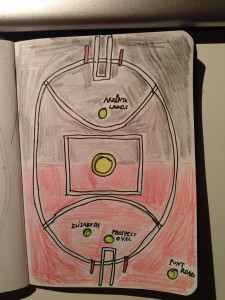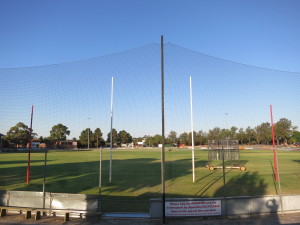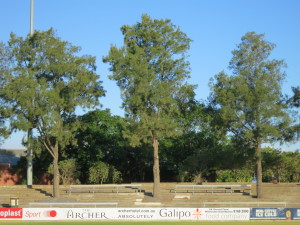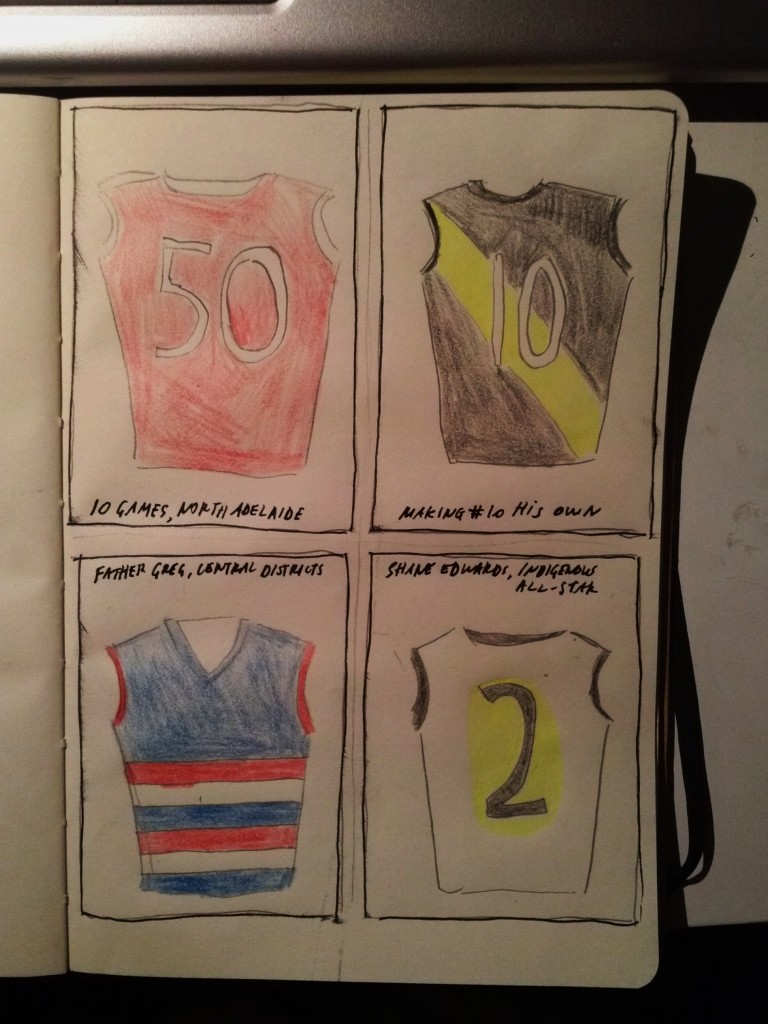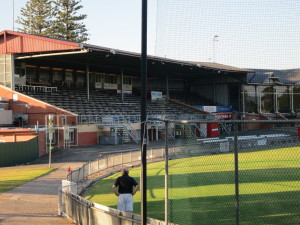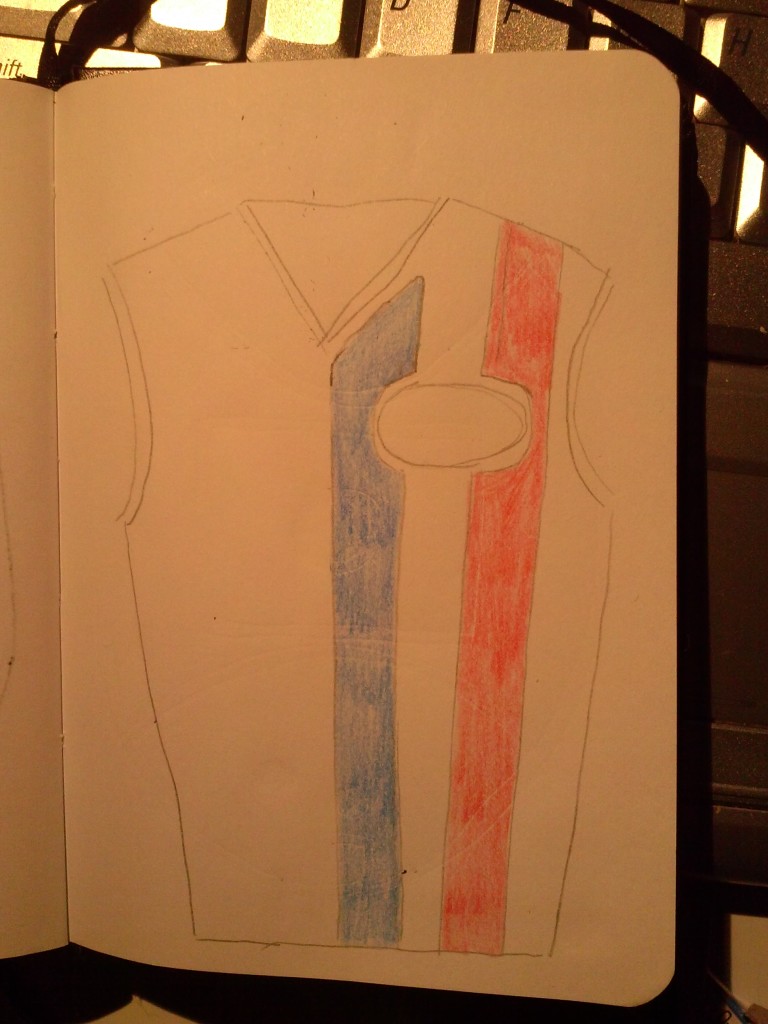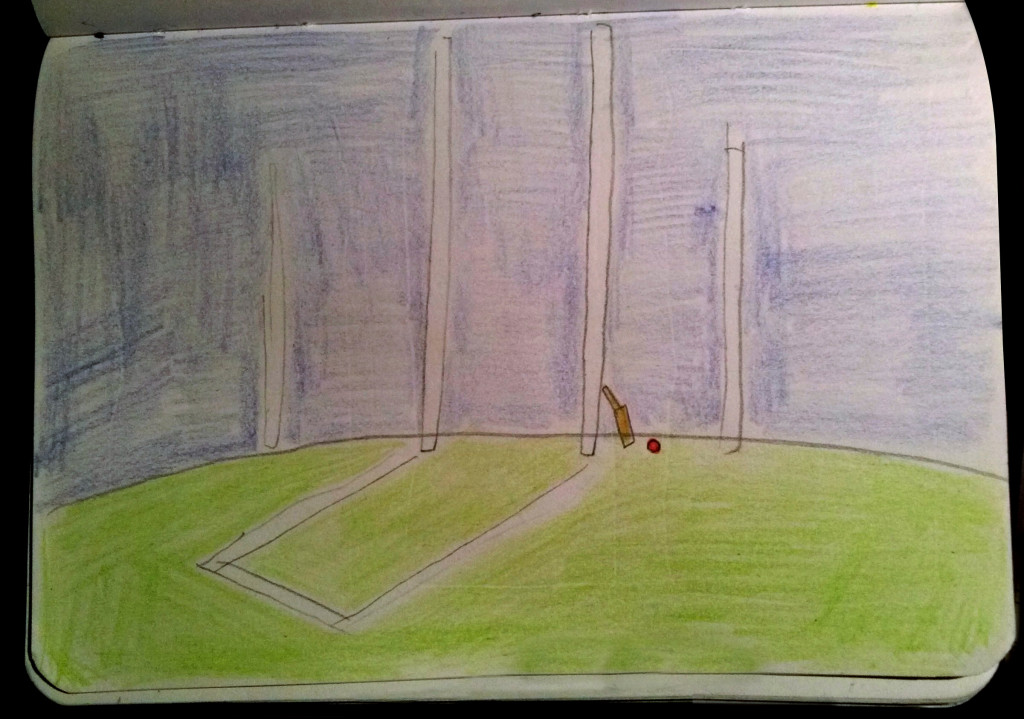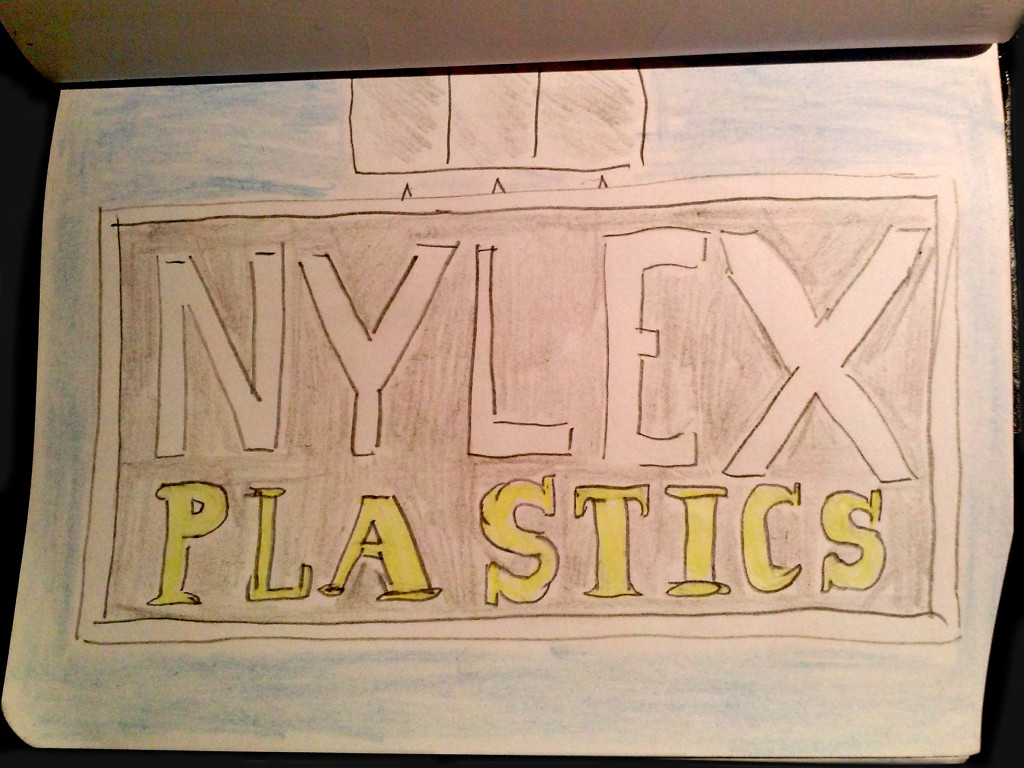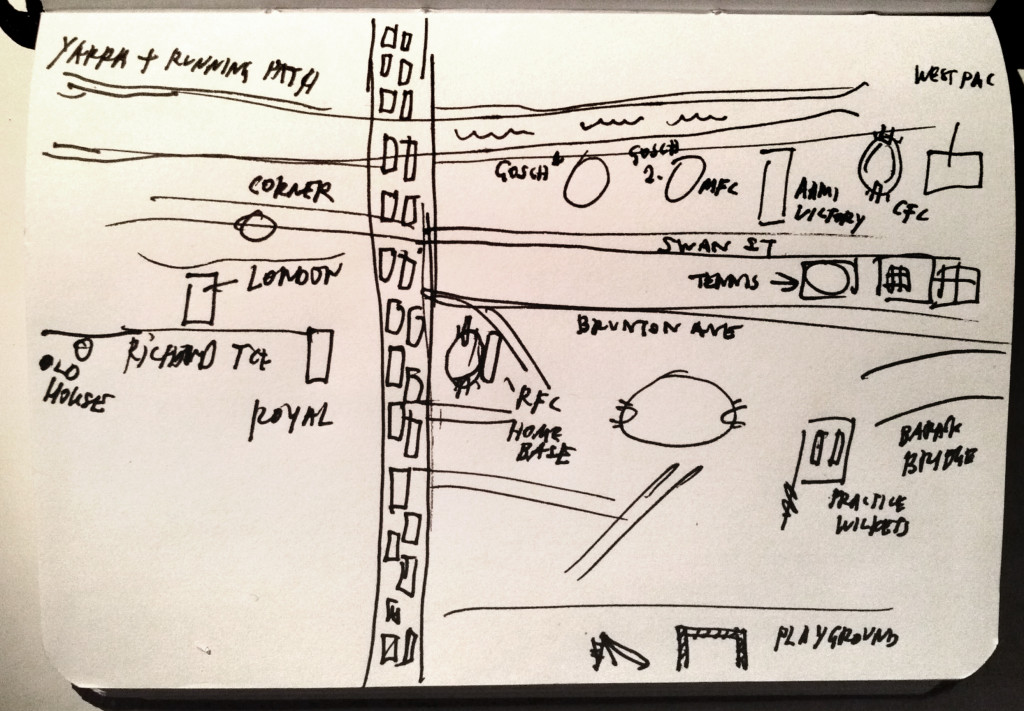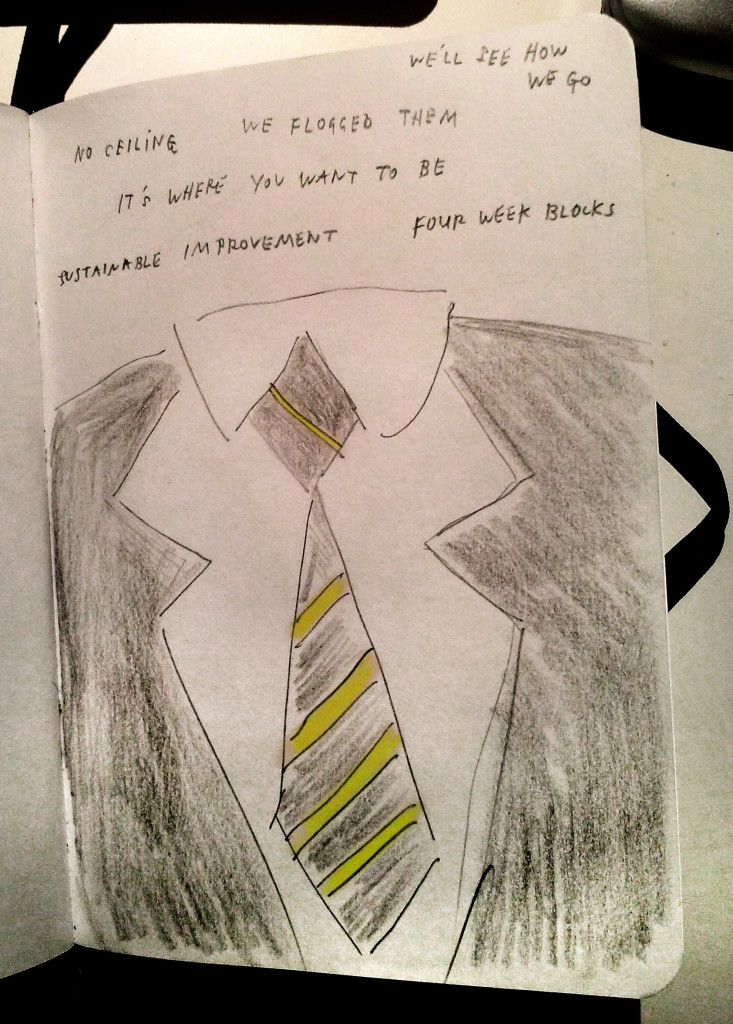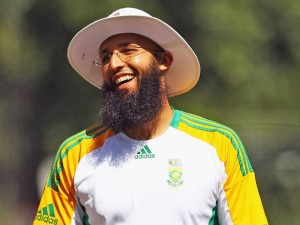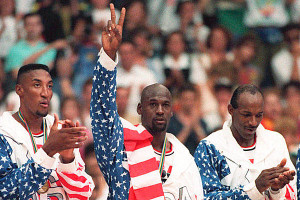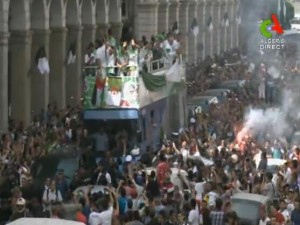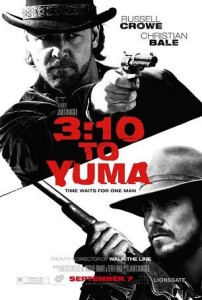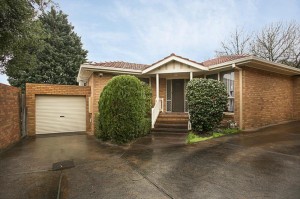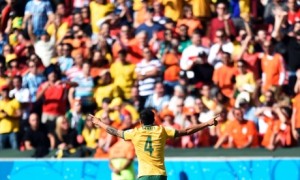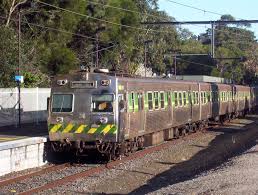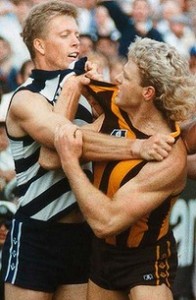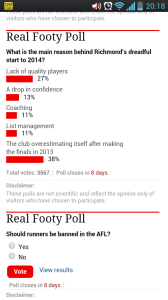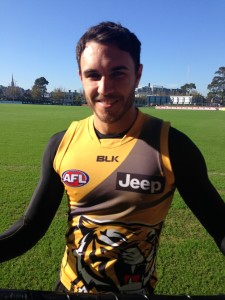 #10 for the Tiges, Titch, Shedda, Shane Edwards, photo by Dugald Jellie
#10 for the Tiges, Titch, Shedda, Shane Edwards, photo by Dugald Jellie
Arms outstretched; the ball falls downwards; hovering in space before being struck with the right foot. So many photos of Shane Edwards evoke the ideal image of the footballer as athlete. Weight shifting, ball tucked under an arm or grasped tightly between two hands, waist high before making the kick. Edwards body is twisting; his eyes looking in the opposite direction to which he seems to be moving. His elbows pointing outwards as he looks up field. Don’t call it just a sport, this is a corporeal art. His masterstroke is that of taking the ball at pace, reading it off a pack and those quick steps which make an empty space for him. A goal or two a match, always necessary. His absence always felt.
▰▰▰▰▰▰▰
Shane Edwards says in a video on the Richmond Football Club website, regarding his experience with the Indigenous All-Stars:
“Drummo has come up. Which has been real important. He is not much of a talker. He is more of a listener. Which has helped make me a bit more of a talker. I was always worried that I didn’t know enough to have an opinion on things.
Learning about who I [am] has had a direct influence on how I play football. Knowing more about myself means that I can be more of myself on the field. It is hard to explain, but … it means, I’ll be the best me out there [on the field] – [it means] I’m not trying to emulate other players. I’ve learned to speak when I should. Give my share when I should. I’m not going to learn more, if I don’t express things. I always have people telling me how old I am, [as] I have been in the system for, going on, nine years. So, hopefully I have learned enough to know a few things.
Arrernte Country, Elizabeth (home of Central Districts, club of Greg Edwards), Prospect Oval (North Adelaide), Punt Road
Telling some mates about where I was going, they said how much fun I would have. But, when I got there, it was this dark, historical place, where some horrific things happened. I was really embarrassed that I didn’t know more. It was such a massive event in my history.
[The week with the Indigenous All Stars] was really fun; it was a really great experience. I have wanted to do it for a long time. It was an honor to be on the field with the other players. Like Shauny Bourgoyne. I was really impressed with Jack Martin.
[…] I was really proud to have the jumper on. My family would be proud of me, all my friends. And all my teammates [from Richmond] would be proud of me. They sent me a lot of text messages before the game. Having the game at the end of the week was a bit of a bonus. The week was a lot more about learning about [our] culture. I formed a closer relationship with every guy there.”
▰▰▰▰▰▰▰
The field of Prospect Oval, North Adelaide, is empty. It’s past 6pm and the sun is burning. Night seems a long way off. A lone runner jogs past. The streets are quiet. There is no movement in the air; Adelaide in early January. Overhead some birds tweet joyfully, moving on somewhere else. The field, empty as it is, is in perfect nick. The wings, the Robran end and the Farmer end have become a part of an outfield across which a leather sphere is belted to the boundary. Here is a public facility; a field on which the traces of past legends remain. A green expanse torn by studded boots. The field is an empty vessel upon which mortals pass and in which fans pour their dreams and imaginations, rendering those mortals into legends.
My father tells me, pontificating, ‘that man, Barrie Robran, he was the best. Simply, the best. Gary Ablett Jr has nothing on him.’ I scoff, believing that in his memory Mr. Robran has become somewhat better than he really was. But, I’m uneducated, I never saw Mr. Robran play and the YouTube clips can’t do him justice. My father gets angry at my incredulity. I’ve never seen him get angry in a conversation about a footballer. Never. I seem to have touched a nerve. For him, sport, footy so easily becomes ‘a waste of time’. And then it comes out: ‘those dirty Victorians rubbed him out in a State of Origin game and he was never the same.’ My father, who has lived and made his home in Melbourne for 40 plus years reveals himself to still feel South Australian, moreover, a North Adelaidian. ‘Leigh Matthews did a job on him.’ And, ‘he, Robran, was an absolute gentleman; he played in the true spirit of the game’. Robran turned down many invitations to play in Victoria: he only wanted to play for North Adelaide.
The view from the Robran End, January 2015
I don’t want to argue with my father about Robran’s skill as a player; I never saw him play. And I don’t particularly care; I believe in my father’s imagination. The memories that the ground has evoked are real. I tell him that I believe that Barrie Robran was no doubt a cut above the rest. This is Robran’s beauty. A few weeks later, I meet up with Ned Wilson, a friend from the olden days and he tells me, plainly ‘my dad [Ray Wilson, 1971 Hawthorn Premiership player], says the same’. Perhaps Robran’s greatest legacy is the manner in which he played the game and the respect he earned from other players, and of course, supporters.
▰▰▰▰▰▰▰
Again, I want to write about Shane Edwards. Partly because he can stake a claim to being one of the game’s least intrusive figures. He is softly spoken and shy by all reports. His style of play is that of the consistent and skilful. Edwards has a light frame and a calm demeanour: probably outdated statistics have him at 180cm and 71 kilograms. No wonder he was a keen basketball player. His celebrations are never over the top and he appears well-liked by his team-mates. Edwards pops up in the background of the videos the Club puts up regarding the lives of some the Club’s bigger name players. Edwards, still looking young and playing youthfully, has become a senior member of the Club. He is a regular and doesn’t have to fight for his spot in the team. Some time ago, a journalistic mistake was made and it was said that there Troy Taylor was Richmond’s only Indigenous player. The mistake was quickly corrected; Edwards asserted his identity. Caroline Wilson not only apologised to Edwards but also included this apology in her article on Edwards, “Living the Dream” (The Age 19th May, 2012).
Shane Edwards wore the White-V of North Adelaide for 10 games; his father though, played for Central District, but is currently CEO of North Adelaide. Shane’s younger brother, Kym, currently plays for North Adelaide. Who was the scout who saw him at Prospect Oval? What were the impressions made? Punt Road Oval, next to the frequently clogged north-south artery of inner-eastern Melbourne, lacks the old-style grace of a suburban Adelaide oval – with its trees providing shade on the eastern wing. Edwards brings a part of it though, through his polite manner and use of such terms as ‘the pill’ for the ball. Adelaide has its own footy landscape and terminology: the point posts are red and a banana is a checkside.
During the off-season between 2014-15 Edwards was a part of the Indigenous All-Stars team. The Richmond Football Club, whether or not it has x number of Aboriginal players on its list, makes a significant contribution to supporting Melbourne’s and Victoria’s Aboriginal community through its Korin Gamadji Institute. Richard Tambling, now working for the AFL in Central Australia, was a part of the process in landing this facility at the Club, that was eventually opened by the very honourable, very respectful Julia Gillard, Western Bulldogs supporter and former Prime Minister. The KGI offers numerous programs for Aboriginal youth. That it is linked with the Club perhaps makes it both appealing and legitimate for those who are targeted for its programs. Of course, one of Richmond’s most notable former players, Maurice Rioli, needs no introduction. The esteem in which he is held was evident in the moving statements upon his untimely death. The beauty of his skill as a player lives on in the memories of fans, regardless of team; his contribution to his communities continually appreciated and remarked upon.
Edwards Jumpers
The AFL is very pro-active in promoting its openness, inclusivity and stance of anti-racism. Mr.Demetriou unequivocally condemned Matt Rendell’s comments that Aboriginal players might need one white parent in order to be drafted by an AFL club. Demetriou denied that any kind of context could make the comments legitimate. I see the AFL’s pro-active stance towards combating racism, sexism and prejudice in its many forms, as part of a recognition that it failed not only generations of Aboriginal players, but, also that it grossly mishandled the Long-Monkhorst case of 1993. The AFL makes strong overtures at being welcoming to Aboriginal players. The Clubs, for all their efforts too, can’t deny that they’re in ‘the business of winning’ and that selection for the main team is extremely competitive. Players who don’t conform and reach the required standards won’t be selected just because it is a nice story to have them in the team. Richmond has had some notable cases where Aboriginal players haven’t been able to make a career at the Club: Troy Taylor, Relton Roberts, Jarrad Oakly-Nicholls, Richard Tambling. Every year, plenty of players fall by the wayside, and as Robbie Burns has pointed out on the Marngrook Footy Show, ‘it is not just Aboriginal players, it’s many from the country’.
▰▰▰▰▰▰▰
Visiting Prospect Oval in North Adelaide created a new conversation between my father and I. He found a moment to passionately his state his personal experience of watching the game. His father, Bon, my grandfather, had played in the reserves for North Adelaide, and later on, when dad was a boy, they would go to games together. He pointed to the spot on the terrace where they would most often stand to watch games. They would park their car at my father’s grandparents house, have lunch and go to the game. He told me they would invariably walk home complaining about the umpiring. During my teenage years though, he no longer seemed to be into footy, or at least watching it live. Art, was his thing and so it was a surprise to see him claim Prospect Oval as a central part of his childhood memory. I think of him taking my brother and I to games as boys, more out of our demands than for his own wishes. But, perhaps he enjoyed the footy more than he let on.
Shane Edwards – of Arunta and German descent, son of Greg – footballer and Tara – basketball player, and brother of Kym, North Adelaide player – plays the game with skill, balance and poise. Like the imposing Ivan Maric, he speaks softly and only occasionally to the press. He is not given to overstatement, boasting or showboating. But, as with other players likes a goal as much as the next. Footy facilitates a path into the nation’s history; one that involves tragedy, movement and reconciliation. Perhaps it was Edward’s move to Richmond which opened the opportunity for coming to terms with his background. He is proud. Regardless of games played, goals scored, finals won, he will leave a legacy with the Club. The Edwards name will belong to both North Adelaide and Richmond.
Trevor Fuller, engineer and art gallery director, remembers
*Thanks to Swish Schwerdt for pointing out that the Central Districts jumper was different to the one I included above. It was more like this:
This video here shows Greg Edwards playing against the Tigers (of Glenelg). Stephen Kernahan is playing for Glenelg and John Platten is playing for Central Districts. Centrals win by a lazy 100+ points. Bruce McAvaney is the host of The Big Replay.
**My father emailed to say, “I always enjoyed that as an opportunity to be with you both [my brother and I at the footy] and to be able to communicate something around the game; have that fun kicking the ball on the oval afterwards in that cacophony of kids, dads and balls in the fading light and for you to get among the footballers in the club room after and garner a few autographs and have a few words with some stars and favourites.” And, on his taste for footy/sport: “I do marvel at the talent of the sportsmen. I don’t like the aggressive macho overhyped stuff that goes with the mercenary media.”
***Aunty Kip: “Robran was that good. He was like a ballet dancer, with his graceful, humongous leaps to mark the ball. And painfully shy, as well.” I’m into the ballet analogy. Perhaps footy is some kind of ‘heavyweight ballet’.
****Aunty Kip, remembers her experience of watching Barry Robran, Rodney Robran, Neil Sachse and Dennis Sachse, through this video of the 1973 Glenelg v North grand final. She says, “I was there”.
*****Shane Edwards sent a message to say that he very much appreciated the article. This kind of acknowledgement was very generous of him. It also suggests to me that professional footballers might want more out of their careers than just a good salary and adulation.
